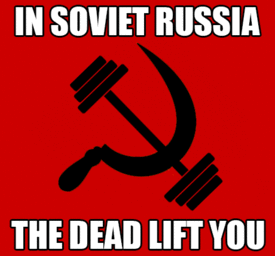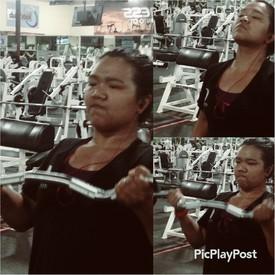High Bar vs Low Bar Squats
Options

erojoy
Posts: 551 Member
So yesterday for the first time I tried squatting Low Bar. I've been reading about the differences and how it affects body alignment and muscles worked and I wanted to see if I could complete a day of MadCow using this option. I go very deep into my squats thigh to calf and the low bar position allowed me to do it a little better, but I still find high bar more comfortable.Watched the guy next to me squatting around 275 with a high bar, which is how I feel everyone is initially taught, but was too scared to ask him if he's tried low bar.
So I thought hey MFP maybe you guys have an opinion. What works best for you? Have you tried both?
So I thought hey MFP maybe you guys have an opinion. What works best for you? Have you tried both?
0
Replies
-
http://www.strengtheory.com/its-time-to-end-this-nonsense-high-bar-vs-low-bar-squatting/
Depends on your goals and preference.0 -
Ya I read that article awhile ago. I was kind of just trying to see what others did here and what worked for them. I'm not really looking for a definitive answer, but Thank You!0
-
I've done both, but I prefer high bar now as it is more comfortable.0
-
I've also done both and I find low bar more comfy.0
-
See I was thinking that it was too. the heavier the weight was, the harder it was for me keep the bar in place on the low bar sets.
I find the differences in how people work fascinating. I'm not going to sit here and say one is wrong or one is right. 0
0 -
it's 100% personal preference.
I prefer high bar- but I tend to squat in a high/low hybrid with positioning (could be tightened up admittedly)- but low bar tends to compress my thoracic uncomfortably.0 -
I started out with high bar, but after about a year or so switched to low bar. Low bar has been best suited to my training regimen; however, I will occasionally phase in a time of adding high bar squats in as a "light" day to mitigate fatigue some as I cannot handle as much weight doing high bar as I can low bar and my front squat SUCKS!
I know the site and article might be powerlifting specific, but the information given between the two are useful and educational.
http://www.powerliftingtowin.com/high-bar-vs-low-bar-squats/0 -
I've only been squatting for a short period of time, but I prefer the low bar position. High bar isn't comfortable to me at the moment, and I feel like my upper body has become stronger from actively pushing with my chest when using the low bar position.
I may try to switch to high bar squats though, because low bar squats hurt my wrists and elbows, and my shoulders aren't very flexible, so they have started to hurt as well. I've watched various form tutorials, but I think my body has been inactive for so long that it's just going to take time for my joints to become stronger and more flexible-- something I'm working on.0 -
http://www.strengtheory.com/squats-are-not-hip-dominant-or-knee-dominant-3/
seriously massively having a geek out over this article.
So awesome.0 -
I've never really thought about it. I just put the bar where it's most comfortable and where I seem to have a natural 'shelf'. Having watched a couple of videos I don't think I am particularly high or low. I'm am a mid bar squatter I guess
 0
0 -
I started with stronglifts, which recommends low bar, and honestly, I've never tried high bar since. Had my first issue with feeling like I was going to drop the bar last week at 180lbs, but my back was also soaking wet and I felt like I couldn't get a good lock. Grip improved when I wiped it off with my shirt. I may try chalk in the future too if it continues to be an issue.0
-
I used to high bar all my squats. Gave low bar a try about two months ago, and every single thing I would normally fight with just went away. With low bar, my back stays effortlessly tight, my weight stays back on my heels. A bit more stress on wrists and elbows but the trade off is well worth it.0
-
I am a total beginner, but for what it's worth: I'm sticking with high bar because I have a tendency to pitch forward too much ("good morning"ing the squat), and high bar form is less forgiving on that respect. It keeps me honest about whether I'm trying to lift too much weight for that day, and I hope will limit injury risk as I increase weight. (I lift in the evening after running hard in the morning, so how much weight I can squat on a given day is variable.)0
-
High bar tends to be more quad dominant, low bar hits the hammies and the glutes a little harder. I am in between and I would like to go full lowbar, but shoulder mobility is an issue for me. I put the bar as low as I can get it on my back and try to squat more lowbar than high.
You will typically be able to move more weight going strict lowbar than highbar as it recruits more muscles than a highbar squat.
In the end, use what works for you. Squats are one of those exercises that seem to change as you add weight, and I have found just as I think I have something figured out on them, I find something else I need to adjust.
If you are having trouble getting the bar to stay in place on lowbar, check the placement of your elbows and grip. Rippetoe has a great video on youtube about how to squat lowbar and the grip involved. Minor changes with elbow position, as in elbows up, thumbless grip with thumbs over the bar instead of around will make huge differences in how you hold the bar for a lowbar squat. Those little changes made a big difference for me.
0 -
@DvlDwnInGA you are right it is definitely about how i'm gripping it. I have the mobility so I don't think I'm not ever going to use this again, but instead trade off and see over time what works for me.
@Iron_Miss_Canada that's an interesting perspective. I've definitely read you can squat more weight on low bar and I really really want to hit 200 by the end of the summer. I did two reps at 185 and my body is like ummmmm I don't know if you want to go further. So I started down and am working my way back up with MadCow. I just really want to hit that 200 goal and more if I can.0 -
Don't over-think this as it's not overly important unless you compete. Find a form that is comfortable for you and squat, keep it simple and just use what feels best. Outside of competition with recreational lifters this gets far too much attention in my opinion.0
-
DvlDwnInGA wrote: »High bar tends to be more quad dominant, low bar hits the hammies and the glutes a little harder. I am in between and I would like to go full lowbar, but shoulder mobility is an issue for me. I put the bar as low as I can get it on my back and try to squat more lowbar than high.
You will typically be able to move more weight going strict lowbar than highbar as it recruits more muscles than a highbar squat.
In the end, use what works for you. Squats are one of those exercises that seem to change as you add weight, and I have found just as I think I have something figured out on them, I find something else I need to adjust.
If you are having trouble getting the bar to stay in place on lowbar, check the placement of your elbows and grip. Rippetoe has a great video on youtube about how to squat lowbar and the grip involved. Minor changes with elbow position, as in elbows up, thumbless grip with thumbs over the bar instead of around will make huge differences in how you hold the bar for a lowbar squat. Those little changes made a big difference for me.
read the article I posted- it was like a follow up on the one that was posted high vs low- and it was about the mechanics of squatting.0 -
I was originally a low-bar squatter.
Had an incident at work that messed up my hip and found during the rehab process that low-bar wasn't swinging it for me anymore.
Switched it up to high-bar and I'm a happy chappy. Not quite up to my prior strength levels yet, but getting there slowly but surely. When I hit my previous max it'll feel like a PR for sure!0 -
@Sam_I_Am77 I hear you loud and clear.
 0
0 -
Iron_Miss_Canada wrote: »I used to high bar all my squats. Gave low bar a try about two months ago, and every single thing I would normally fight with just went away. With low bar, my back stays effortlessly tight, my weight stays back on my heels. A bit more stress on wrists and elbows but the trade off is well worth it.
I've never really spent much time with high bar except as an accessory. I can move more weight low bar but you hit the nail on the head with wrists and elbows. I really have to cast my wrists and use a thumbless grip. My elbows have been kicking off recently as well and I'm considering going geriatric and training with elbow sleeves.
Mind you, I keep my hands in tight right against my shoulders. I've tried going wider but back tightness suffers.0 -
DvlDwnInGA wrote: »
You will typically be able to move more weight going strict lowbar than highbar as it recruits more muscles than a highbar squat.
It may recruit more muscles but the primary reason you can squat more low bar is you are moving the load (bar) closer to the fulcrum. If you think of the movement as a basic lever, the lower the bar, the closer the load is to the centre and the shorter distance it has to travel.
0 -
^^^ yes that is what I've learned from research as well.
 0
0 -
I did low bar today for the first time and it felt a lot better. With high bar, the bar was pinching a nerve or something0
-
I'm with the others that said it's preference? I'm usually use the high bar position, but noticed that my back does stay tighter, and chest more outward with the low bar, but with heavier weight, I feel like the bar is just going to slide down my back, so I end up reverting back to high bar. I'm sure I have grip issues, but I think both are great.0
-
My shoulders are bad. Low bar scares me. I just add padding with high bar as needed. Above 200lbs with no padding can sometimes bruise.
I'm a long way away from that now, sadly. LOL.0 -
My body structure prefers low-bar squatting. Again, it's all about preference and if you're not competing it really makes no difference in my opinion...... best of luck to you!0
-
First thing, with either proper form is required. I see no one else in the gym squat to proper depth, etc, but I go to a globo gym.
I think it's best to think about the program you are doing as a whole. I think it's best if possible to do low bar if you are following starting strength, mad cow, or strong lifts. I think Rippetoe has a little bit more science behind why you use LBBS on his program than various other authors. If you are following one of those programs, get strong with proper form past the novice stage, then think about high bar or front squats etc.
Because of lack of shoulder flexibility, I did high bar for a long time. Eventually if you put it down low, you will become flexible enough, but it takes a while. For me, it might only be 2 or 3 inches (bar just below spine of scapula), but it definitely feels a lot different and will work the muscles slighly different than high bar. Try it for yourself with proper depth and hips and you will tell the difference.0 -
I like low bar. I feel more in balance since you lean forward more at the bottom. I feel like I'm going to tip over backward doing high bar and keeping my upper body more upright. I've wondered if this is because I have such big hips/*kitten*.0
-
I find low bar allows me to hit the depth I want the easiest. I've done both consistently and just based on my body structure find low bar to be a bit more comfortable while squatting.0
-
http://www.strengtheory.com/squats-are-not-hip-dominant-or-knee-dominant-3/
seriously massively having a geek out over this article.
So awesome.
Thanks for sharing JoRocka0
This discussion has been closed.
Categories
- All Categories
- 1.4M Health, Wellness and Goals
- 396.9K Introduce Yourself
- 44.2K Getting Started
- 260.9K Health and Weight Loss
- 176.3K Food and Nutrition
- 47.6K Recipes
- 232.8K Fitness and Exercise
- 453 Sleep, Mindfulness and Overall Wellness
- 6.5K Goal: Maintaining Weight
- 8.7K Goal: Gaining Weight and Body Building
- 153.3K Motivation and Support
- 8.3K Challenges
- 1.3K Debate Club
- 96.5K Chit-Chat
- 2.6K Fun and Games
- 4.5K MyFitnessPal Information
- 16 News and Announcements
- 18 MyFitnessPal Academy
- 1.4K Feature Suggestions and Ideas
- 3.1K MyFitnessPal Tech Support Questions

















